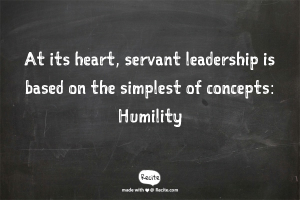 This article in HBR by Dan Cable talks about how important it is for leaders to be humble, patient, and servants of the employees that work for them. Employees are stifled when leaders “become overly obsessed with outcomes and control, and, therefore, treat their employees as means to an end“.
This article in HBR by Dan Cable talks about how important it is for leaders to be humble, patient, and servants of the employees that work for them. Employees are stifled when leaders “become overly obsessed with outcomes and control, and, therefore, treat their employees as means to an end“.
It goes on …
“But one of the best ways is to adopt the humble mind-set of a servant leader. Servant leaders view their key role as serving employees as they explore and grow, providing tangible and emotional support as they do so.”
“… when leaders are humble, show respect, and ask how they can serve employees as they improve the organization, the outcomes can be outstanding.“
All this sounds great, and like it should be true, but it just seems a bit pat; a bit “humble pie in the sky”.
And it’s not that I think this leadership style does not, or cannot, work. In fact, I really hope it does, because this is my own leadership style for my employees. We are very collaborative across the board, encourage individual creativity, and I actually love it when they have a better idea than me!
 That said, who are the greatest visionary leaders of our day? People like Elon Musk, Jeff Bezos, Steve Jobs, with SpaceX, Amazon, and Apple have led their respective corporations to truly transform our world. And to do this, each of these men saw beyond the current standards and forged entirely new paradigms.
That said, who are the greatest visionary leaders of our day? People like Elon Musk, Jeff Bezos, Steve Jobs, with SpaceX, Amazon, and Apple have led their respective corporations to truly transform our world. And to do this, each of these men saw beyond the current standards and forged entirely new paradigms.
But.
They are all famously short-tempered and even borderline (and many would say far beyond borderline) abusive to their employees. No one who has ever interacted with these men would call them humble, or servants of their employees. Their employees had to drive themselves hard every day or face one of Bezos’ “nutters”, Jobs’ “nastiness”, or the completely unrealistic expectations of Musk.
So there is a disconnect between what we say makes for great corporate leadership, and what transformative CEOs actually do. The greatest visionaries of our age, accomplishing the most amazing things, have leadership styles that we now call detrimental and corrosive to productivity.
Are we wrong about the humble servant-leader? Maybe the leadership style of the patient listener, “serving employees as they explore and grow, providing tangible and emotional support as they do so” can only get you to be a base-hit company. But if you want to be a grand slam company that upends the power grid, gets us to Mars, owns online commerce, or completely reorients personal communication for generations, maybe the CEO should act like one of the irascible ego-driven leaders who have actually hit a grand slam.
The point of this article is not to choose one of these sides, but to advocate for the middle ground. I don’t believe visionary leadership must be ugly and treat people badly. But it’s quite obvious that being ugly and treating employees badly does not preclude corporate greatness either. And that’s really the issue. There is a conversation happening in business writing today that glorifies the leadership styles of the patient supportive listener and humble servant-of-the-people model.
However, without acknowledging that this is only one style of leadership, and not the right style of leadership, we paint a completely unrealistic picture. It would be better for us to look at each style dispassionately, assess what works, what doesn’t, and why. That way CEOs can better optimize their leadership approach based on who they are, rather than who someone else thinks they should be.



